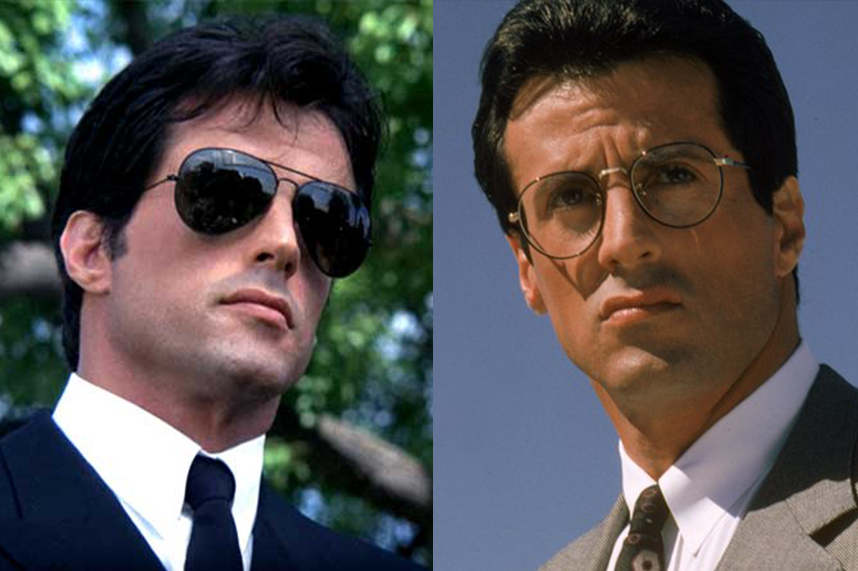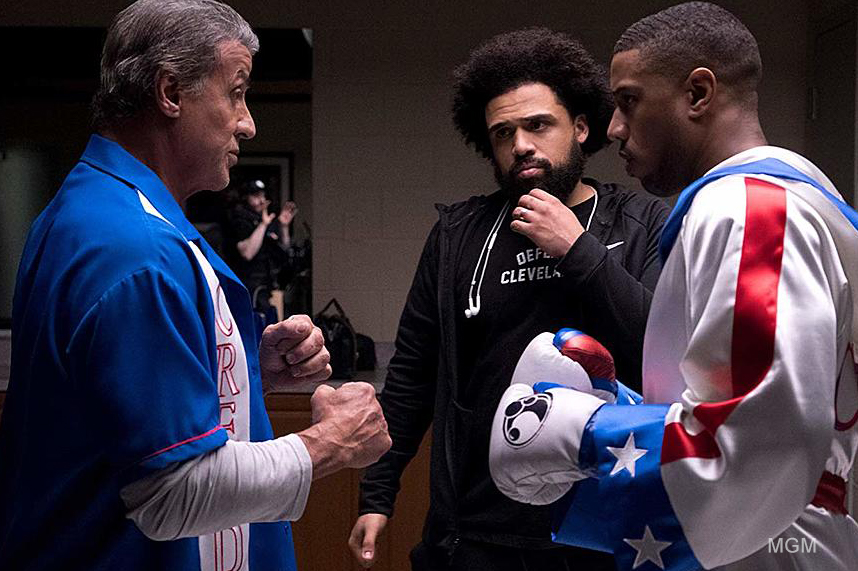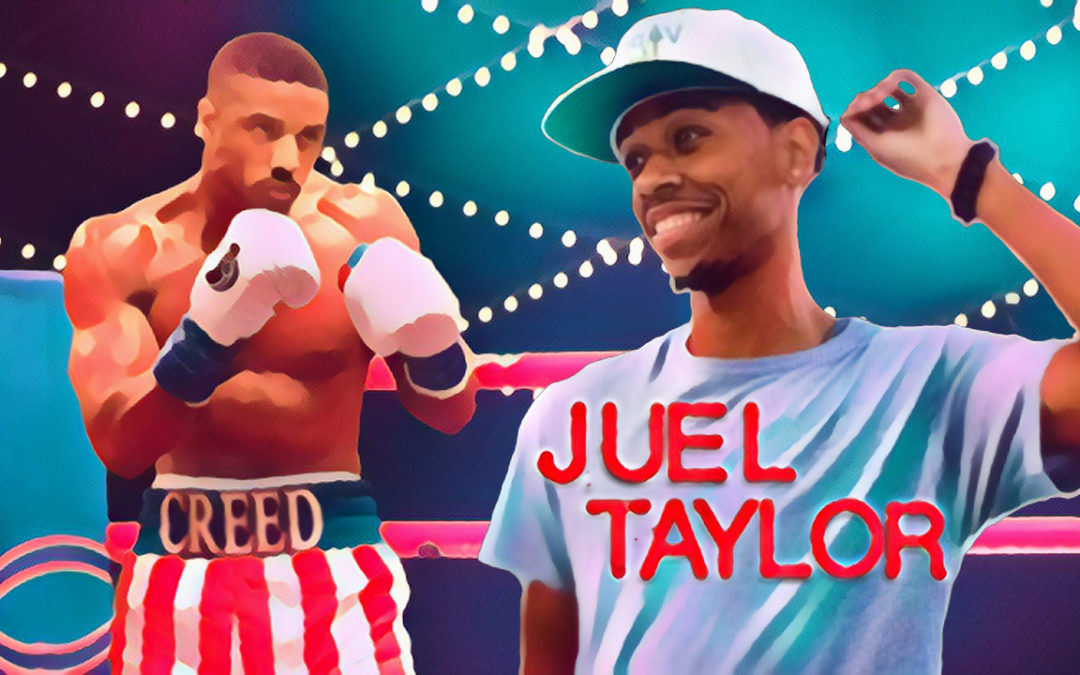About Juel Taylor
Juel Taylor is a graduate of the University of Florida and holds an MFA in Film & Television Production from the USC School of Cinematic Arts. He and his writing partner, Tony Rettenmaier, have several projects in development, and he recently collaborated with Sylvester Stallone on the script for CREED II. A friend of Lunacy Productions, he stopped by to tell us a bit more about working on that blockbuster sequel (currently the biggest live-action Thanksgiving opening in history!).
Lunacy: So first of all, congratulations. Creed II looks great and it’s already a huge hit! How did you get hired to work on this?
Juel Taylor: Really it was (director) Steven Caple Jr. He put my name out there and…
LU: Did you work with him at USC at all?
JT: No. I was just a PA on some of his early projects. I knew him, but I didn’t actually get to know him really well until after he had graduated. He already had lot of stuff going on, but I guess some people told him that I be writing, so he was like, “Yo, let me read some of your stuff.” I sent him some scripts and it kinda went from there.
LU: So what was the situation when you got hired on? Did they already have a script? I know Cheo Hodari Coker was working on this at one point…
JT: Yeah, there were already pre-existing scripts that even predated Steven getting the job. So when he came on, of course, he wanted to put his flavor on it. So it was a rewrite job.
LU: Ryan Coogler (Creed writer/director) was an executive producer on this film. How involved was he in this?
JT: He gave notes, but he pretty much gave Steven the freedom to do what he wanted, you know? So he wasn’t really hands-on in trying to steer Steven in any particular direction. He was pretty chill. Even in the very beginning, he was super supportive, just saying you gotta feel comfortable with the movie you wanna make. He just gave Steven his blessing and let him run with it, you know?
LU: What was it like working with Sylvester Stallone? How did that collaboration work?
JT: Working with Sly was crazy ’cause you don’t know what to expect. Obviously this guy’s an icon and an OG in the game, so I really didn’t have any expectations. I was trying to keep a blank slate ’cause I didn’t wanna get my hopes up, but he turned out to be cool. He’s a writer for real. In terms of his disposition, you know, he’s as self-conscious as the rest of us, you know what I mean?
Like, there’s Sly the movie star and then there’s Sly the writer. He’s very humble as a writer…

Sly the movie star (left) and Sly the writer (right).
LU: Were you guys working in a room together a lot or were you trading drafts back and forth?
JT: No, the way it worked with Sly is I started working off a draft that he had co-written with Cheo. Basically it was a draft that Sly had done and then we reworked it. And then we would do a pass and then Sly would do a pass and then we would do a pass and so on. And when it got time to be on set, that’s actually when I worked with him in person. So when we got to set, you know, you’re still always working the script until the end of the shoot and even in the post, you’re still writing.
You might be writing fight dialogue because the scene choreography changed, you know what I mean? We were still writing as of about a month ago. We’d need a little more ADR or the location would have to move, and so you have to tweak the scene in real time. The writing never ended.
LU: Were you on set every day?
JT: About half the time.
LU: That must’ve been cool. This is a huge movie!
JT: Oh yeah, no, it was crazy. It was surreal seeing that level of resources. Compared the discounted version that you get coming from USC with student films, to this shoot where everyone’s got a trailer, everything is paid for, you’re getting pretty much the full movie experience, you know?
To see the engine when it’s revved up and there’s just an army of people that are there every day to do whatever Steven needs them to do. It’s crazy, especially being a writer where you’re in this pocket of… In my case, Steven was super collaborative, so I’m right next to him the whole time. And having that access but also having the freedom to go back to the trailer, work on stuff, just having that carte blanche to move around? When you get to set as a writer, it’s not too bad! It was awesome.
LU: That sounds nice. In the indie film world it seems like you’re usually putting out fires all the time. That sounds much better.
JT: Oh, there were fires, they just weren’t for me to have to deal with, you know? At USC, if you’re a director and something’s is going wrong, you’re freaking out ’cause you’re basically a producer too.
LU: You might be everything.
JT: Yeah. You may be operating the camera, you’re probably editing it. So if something came up, it’s on you. And that’s not to say Steven wasn’t aware of problems that came up. Because you know Steven is hyper aware of everything. I’ve only had this one experience up close, so I don’t know how it normally is, but I thought they did a good job of freeing him from distraction.
LU: Yeah that’s the best thing you can do sometimes, is just make sure the director can direct. I imagine Steven was pretty heavily involved in all your drafts, right?
JT: For sure. Everything we wrote was to Steven’s vision. He had a very specific idea of what he wanted to do, and because of that it was a lot easier to break the story. Now mind you, the story still has plenty of elements from the prior draft too. But Steven was there throughout the process of breaking it again and he was very specific as to what he liked and what he didn’t like, which is obviously very useful. He was like, “I’m not feelin’ that, I’m feelin’ that, I’m not feelin’ that, I want something like this.” You know what I mean? So as we were writing, we had a very specific set of colors to paint with, which made the job a lot easier.

“I’m not feelin’ that, I’m feelin’ that, I’m not feelin’ that…”
LU: Not only were you writing a sequel to a hugely successful film in Creed, but Creed II also calls back pretty heavily to Rocky IV. How much did that film inform what you were doing? Were you pretty familiar with it coming in, or did you have to do some research?
JT: Oh I love Rocky IV. I grew up on Rocky IV. As a kid Rocky IV was the one I knew the best.
But you’ve gotta understand that we’re not writing it for ourselves, just sitting down like, “Well, what do I wanna see?” It doesn’t work like that at all. There was a lot of attention paid by MGM, the producers, the powers that be, to make sure that there was the right amount of homage paid to the Rocky sagas.
LU: Yeah, they got a brand to protect here.
JT: They got a brand to protect and they gotta make sure that long-term fans of the series are getting some level of closure from Rocky IV. That’s really the trickiest part: your assignment is basically to remix the old in a way that doesn’t feel like you’ve just seen the same movie.
You’re always battling this idea of, “Okay, well are we retreading old ground?” And of course, given the story you have to work with, you may be. You’re gonna have to re-tread something. So you’ve got to balance making it feel like there was some level of circularity, while at the same time making it seem like it’s something new, ’cause they can almost be a little oxymoronic.
“Fresh circularity” just seems like an oxymoron, but that’s the job. If these are the toys we have to work with, okay, we’ll try to make it as fresh as possible.
And with so many characters, the other thing is you’re adding a whole new half of the movie in terms of following the quote-unquote villains. You’re still trying to pack their story in and make it feel robust, while still giving Adonis, Rocky, Bianca their due diligence. You want to feel just as engaged with them while adding Ivan and Viktor’s story, so how do you kind of divide the screen time? How do you divide the page length in a way that they both feel like they’ve been serviced.
LU: The Dragos’ storyline is surprisingly deep for the “bad guys,” and also echoes the father and son motif throughout the film.
JT: The themes, like the father and son dynamics, are kinda set up for you already, given the source material. Steven really wanted to tell a story about the family and fatherhood and the parallel between them. The second you say that Ivan Drago has a son around the same age as Adonis, you instantly see how the two of them could be kind of kindred spirits.
They both have parental issues, abandonment issues. And once you triangulate that, Drago and Adonis both have the same wound. They’re both dealing with feelings of inadequacy, feelings of abandonment. They could have very easily been friends had they met at a bar to commiserate over their given circumstances.
So with the Dragos we really tried to build it to a fight at the end where there was at least a little bit of ambiguity as to how you felt. You want Adonis to win, but you don’t want Victor to lose. Or not that you don’t want him to lose, but you don’t want him to go back to where he was. That was our main goal, to have a little bit of conflict in the audience in terms of how they were feeling.
It’s not like bursts of inspiration. It’s just like smashing it over and over…
If you sit in a room long enough, something is going to materialize.
LU: What was the biggest challenge in working on this project?
JT: The biggest challenge was navigating the amount of people that have input on the story. And they’re all very, very smart people. Working within a studio system is something that is hard to know until you do it. Learning how to serve many masters.
Executives, producers, actors—all of them have wants, needs, wishes. And all of them have a point! When you’ve reached that stature that you’re making a movie like this, you know what you’re talking about. A lot of people have ideas, and they can’t all be serviced, so there you get into the political aspect of writing.
It’s something that you don’t learn in film school, because you ain’t gotta please nobody but a teacher.
If two producers vehemently disagree with each other on something, where does that leave you? Because it happens all the time. One person wants to see this, and one person wants to see that. One person believes this scene should go this way, one person thinks that it should go that way. How do you manage that?
Because the job is not just to do the job but to do it in a way where everybody feels like you were listening to them. That’s probably the hardest thing. To make everyone feel like they have been heard and their notes have been taken into consideration and that you were easy to work with, etc.
LU: That’s a great lesson. It’s like a minefield. So let’s pivot a little bit here and talk more about your process. I know you’ve always got a million things you’re working on. As a writer, what’s your typical day look like? How do you organize your time?
JT: Well I have a writing partner, Tony Rettenmaier, and we pretty much just hang out at the house all day. He comes over around noon, and then he usually leaves at midnight, six or seven days a week. I think it’s the consistency of doing something every day that kind of adds up, you know what I mean? The process for us is just being around each other and having projects to do, and just showing up to “work” every day. Even if it’s small, just the repetition of doing it all the time is just where the output comes.
LU: There is something about treating it like a job where you gotta show up every day.
JT: Oh yeah, no, it is our job. We got deadlines. It’s not like bursts of inspiration. It’s just like smashing it over and over, poking your eyes out and frustrated, but eventually, if you sit in a room long enough, something is going to kind of materialize.
LU: You hope so, right? So what’s next for you? I know you’ve been pitching a bunch of stuff…
JT: Okay. This is off the record. We’ve got three different projects that I can’t really talk about yet…
ED.NOTE: JUEL’S WORKING ON SOME HOT PROJECTS RIGHT NOW! WE’LL TRY TO GET HIM BACK FOR ANOTHER INTERVIEW WHEN HE CAN TELL US MORE ABOUT THEM, BUT WE MIGHT NOT BE ABLE TO GET A MEETING WITH THIS GUY A YEAR FROM NOW!
LU: Wow, those are really… You’re getting some good gigs!
JT: Not bad. Not bad. On the record, we just sold our short story called “ByAll” to Legendary. We’ll be writing the script. Hopefully we’ll be able to go into production on that next year. We’re really trying to get the green light on our own projects that we’ve pitched and/or sold, get over the hump.
LU: Yeah, well all these big jobs should help. Okay! This has been great. Anything else you want to add? Any advice to aspiring writers who potentially want to get where you are?
JT: The main thing is just not to be so precious about how good it is, but just that it exists, that you can keep iterating on it. Think of it more as just chipping away. Eventually you get there. You just keep consistently doing it.
The quantity breeds the quality.


Great interview. Very informative. Proud of my nephew…😀
I really enjoyed this interview.Very informative